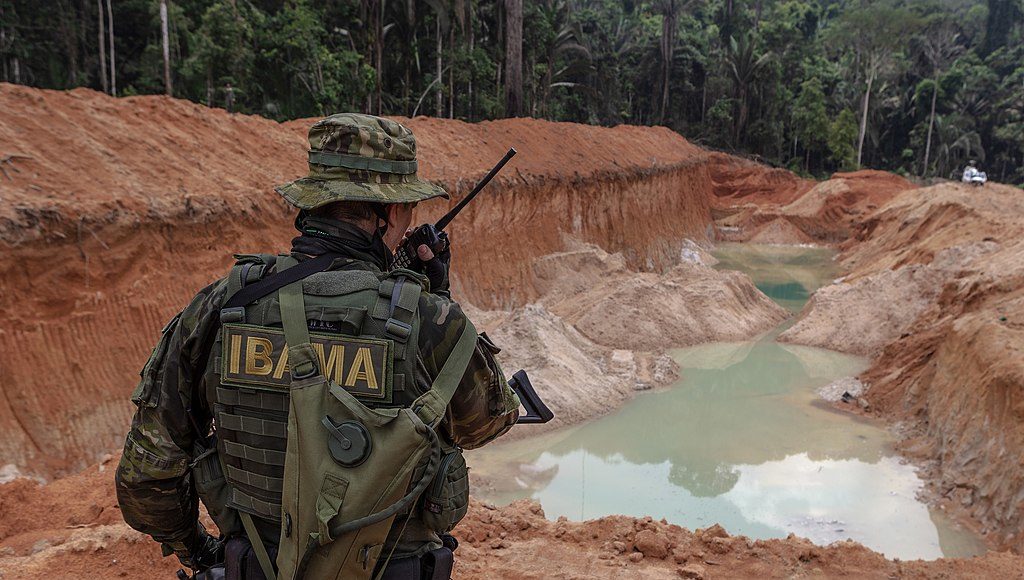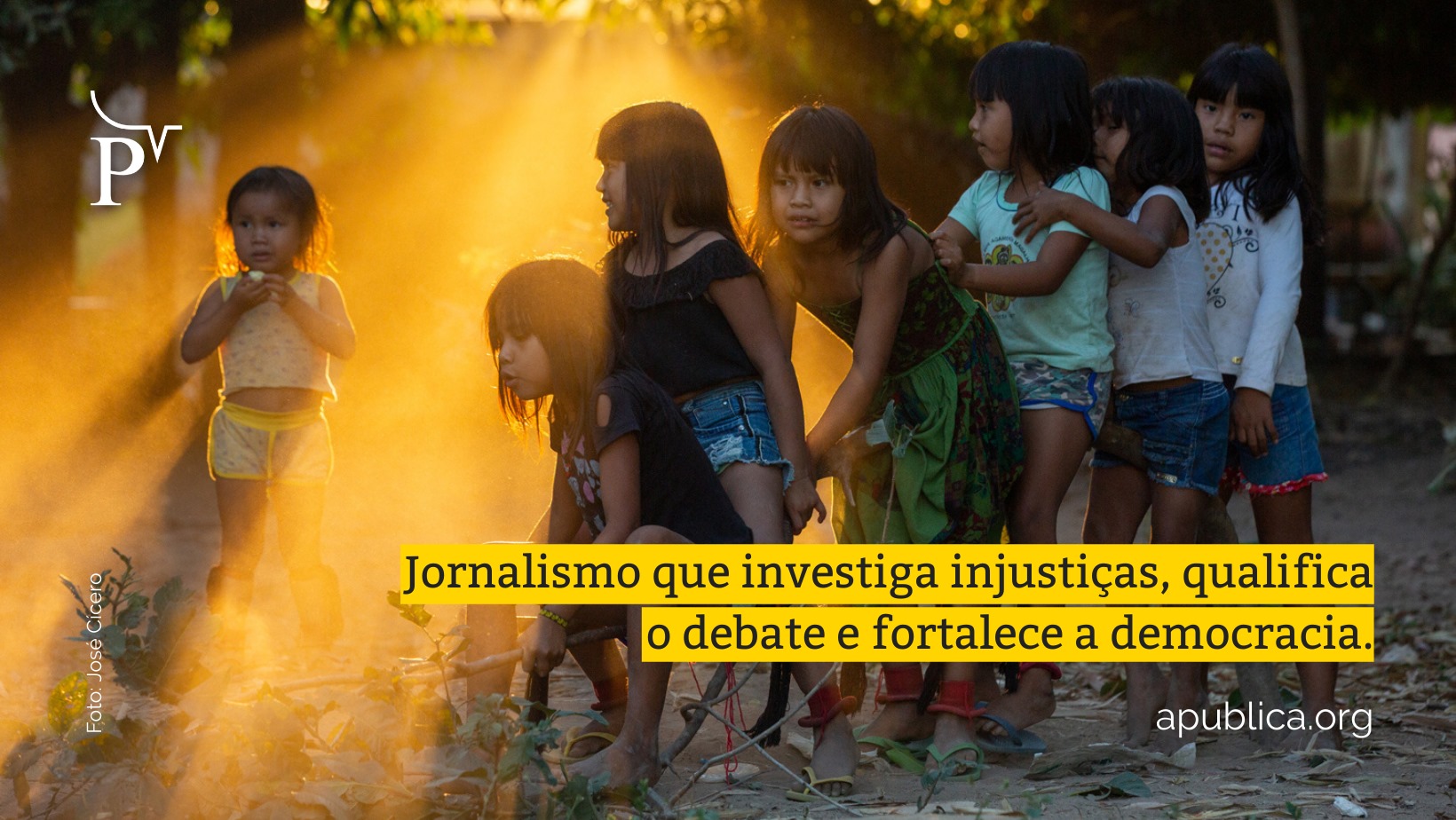The 2,000 figure is an estimate by Brazil’s Federal Police, who have been carrying out operations in the reserve since March. Raposa Serra do Sol is normally home to 22,000 people.
This report is part of an Agência Pública project entitled Amazônia sem Lei, which investigates violence related to landholding registration, demarcation of indigenous reserves and agrarian reform in the Amazon region. The project also covers conflicts in the Cerrado, the second largest biome in Brazil.
Translated by Tom Gatehouse, as part of LAB’s ongoing partnership with Agência Pública. You can read the original article (in Portuguese) here.
A decade after the conflicts which accompanied its official demarcation, the Raposa Serra do Sol Indigenous Territory has once again become a battleground. This time, the cause is the expansion of garimpo – illegal artisanal mining – in the region, indirectly encouraged by President Jair Bolsonaro and a controversial bill he tabled in February which aims to legalize mining on indigenous lands.
At Brazil’s northernmost tip, in the state of Roraima, Raposa Serra do Sol has long been a target for the mining industry, with a subsoil rich in gold, diamonds and other strategic minerals. Spreading over more than 1.7 million hectares, it is home to 22,000 indigenous people of five different ethnic groups, with internal divisions between the different ethnicities and indigenist organisations.
“You’re sitting on top of trillions of reais,” said Bolsonaro during a livestream recorded last December, alongside some indigenous leaders who back his proposal. “You can’t go on being poor when you live on top of such rich land.” Such statements have given carte blanche to invaders.
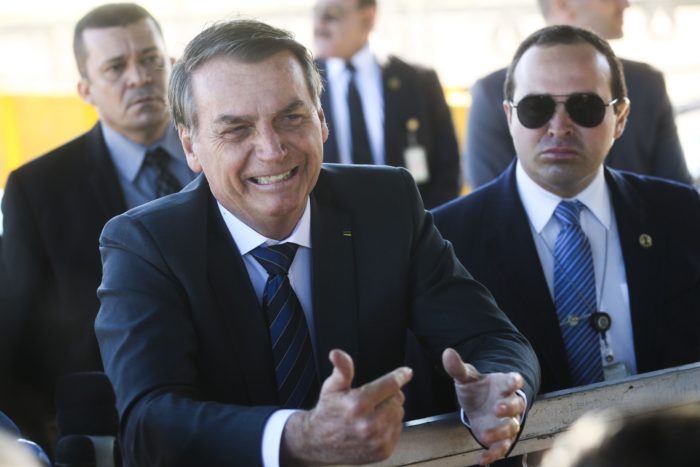
The Federal Police (PF), with the support of the army, has carried out two operations in the region in the last two months alone, aiming to stop the wave of invasions. They have arrested indigenous people and non-indigenous businesspeople and apprehended equipment used in gold mining.
During an operation in the region known as Raposa, in mid-March, the police counted nearly 960 people, divided into 12 groups, working at full capacity.
According to the police, 24% of the gold extracted remains with the owners of the machines used to process the mineral, 72% is given to the garimpeiros (both indigenous and non-indigenous), with just 4% of the profits remaining in the local community.
The same system is believed to be in place in other garimpos identified in the Serra do Sol area, where activities are also in full swing, even with the coronavirus pandemic moving into indigenous territories.
The PF don’t have reliable statistics on the total number of garimpeiros, though they estimate that in each of the garimpos the numbers are similar. This would mean a total of nearly 2000 garimpeiros at least, spread throughout the Raposa Serra do Sol Indigenous Territory in search of gold.
This is a perilous situation for a region which, prior to the current government, had enjoyed a period of peace. In 2005 its borders were ratified and four years later several rice producers who had illegally occupied land in the reserve were definitively expelled – though this was preceded by a series of armed conflicts.
Bolsonaro is what has made the difference. In a clear bid to facilitate the passage of his mining bill, he has sought the support of the Society for the Defence of the Roraima Indians (SODIURR), an organisation which backed the rice farmers in the previous conflict.
The group opposes the Roraima Indigenist Council (CIR), which is the strongest local organisation. It represents 72% of the 342 indigenous communities in Roraima and is fighting for more traditional methods of production, based on preservation of natural resources.
SODIURR, on the other hand, defends a broader concept of development, based on partnerships in mining and agriculture, including cattle farming, using the capitalist methods favoured by large enterprise. The organisation has the support of 17% of the communities.
“The president’s discourse has brought the non-indigenous to the territory. Now, with the advance of coronavirus, the health situation here is complicated,” says Edinho Batista de Souza, a Macuxi Indian and vice-president of CIR.
Bolsonaro’s explicit support for mining may have stimulated invasions, but it has also served to motivate CIR leaders, who began monitoring the territory and organising events to raise awareness amongst the different indigenous groups in Raposa Serra do Sol, urging them not to be seduced by promises of easy money.
For Edinho, the government’s proposal doesn’t only threaten indigenous culture and their traditional way of life. It would also mean serious consequences for the environment and human health, with the rivers becoming contaminated due to mercury dumping.
“Wherever there’s garimpo, there’s destruction,” says Edinho. “The ones who profit are non-indigenous garimpeiros, businessmen who install the machinery in indigenous lands and traders who sell the inputs necessary for mining, like mercury. We know what the costs are in terms of health.”
This is a reference to the Yanomami people, another indigenous group from the north of Brazil who have been affected by invasions of garimpeiros and the pollution of their rivers with mercury. Edinho claims mercury is also being widely used in the garimpos of Raposa Serra do Sol.
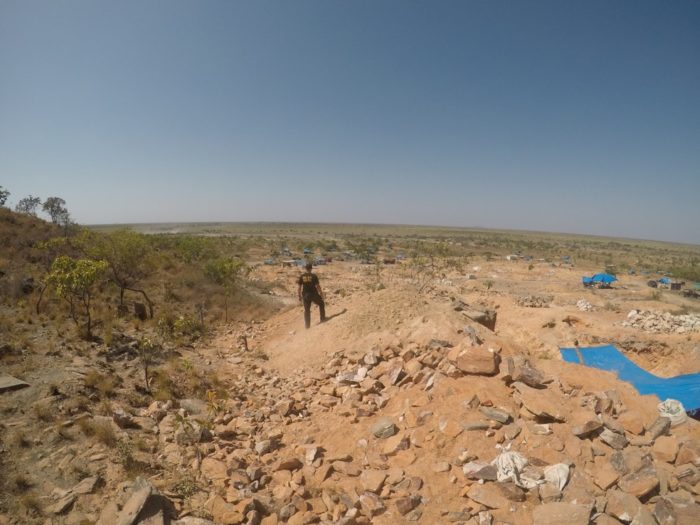
Mercury poisoning
Ana Carolina Bragança, coordinator of the Amazon Taskforce – an initiative of the Public Prosecutor’s Office aiming to combat organised crime, illegal mining, deforestation, seizure of public lands, rural violence and the trafficking of wild animals in the region – says that illegal mining is connected to a whole series of other crimes, such as money laundering for gold extracted illegally.
However, its most sinister dimension is its impact on human health, due to the use of mercury. A 2018 survey on small-scale mining by the Ministry of Mines and Energy found that out of 35 gold-producing operations studied in the Amazon, 95% used mercury in the process of amalgamation.
Another study by the Instituto Oswaldo Cruz, one of Brazil’s most important public health research institutions, laid bare the disastrous impacts of garimpo on the Yanomami people. 91% of the population have levels of mercury in their blood above the recommended limits of the World Health Organisation (WHO).
Mercury dumped in rivers gets converted into methylmercury, a chemical element which causes brain damage, including intellectual disability. It can also impair the development of unborn babies during pregnancy.
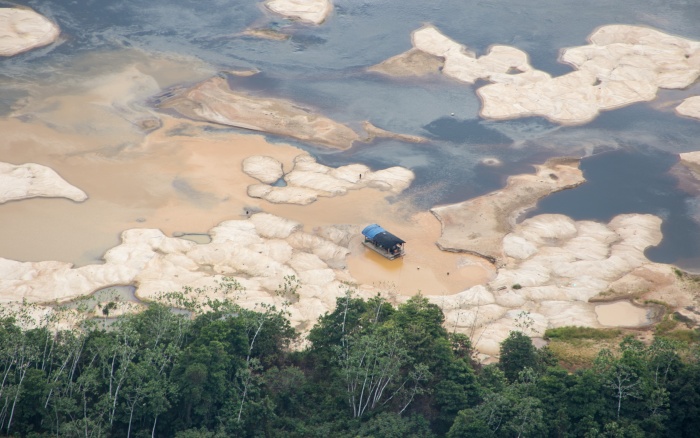
According to Edinho, most of the Indians from communities linked to SODIURR are also associated with CIR and reject mining. The organisation is doing a detailed survey on the presence of garimpeiros and has been in close contact with the army, the Public Prosecutor’s Office, the Federal Police, the environment agency (IBAMA) and the National Indian Foundation (FUNAI), in order to bolster operations to expel garimpeiros currently within the reserve and block those attempting to enter via other Brazilian states or from Venezuela and Guyana.
The organisation also has a group of 400 indigenous guardians responsible for monitoring territories in the state. Currently, their focus is on containing the coronavirus pandemic.
Irisnaide Silva Souza, the president of SODIURR, parrots Bolsonaro’s discourse. She argues that CIR is influenced by national and international NGOs which are anti-mining and are using the issue to ignite the 2005 conflict all over again, stirring up tensions within indigenous communities.
“The fight has started all over again. They [CIR] have started to report on operations and demand action against indigenous people involved in garimpo. They’re extremists who are anti-progress,” she says.
But for Edinho, what’s really behind the bill are the interests of American and Canadian multinationals, which would be welcomed with open arms by Bolsonaro. Following the negative fallout to his proposal, Bolsonaro backed down – for now.
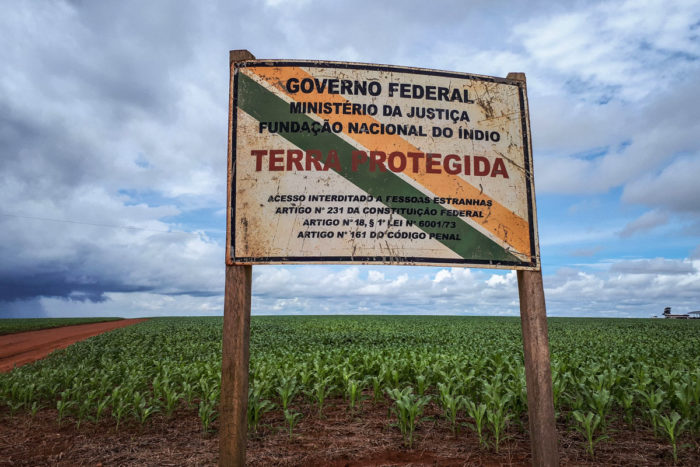
“The state security forces must organise a tough, long-term operation to expel invaders throughout the Amazon and prevent conflicts which might be exacerbated by the coronavirus pandemic. There is constant tension in the region,” says Bragança, coordinator of the Amazon Taskforce.
The image of the garimpeiro doing artisanal miningwith gold pan and pickaxe is part of the history of the Amazon region. But for Bragança, this figure no longer exists. “Now they’re businesspeople in the mining sector. They make big investments in machinery and hire workers to do the extraction.”
She says that the gold extracted illegally from indigenous territories feeds a whole system of money-laundering. First, false declarations of origin are produced; then the product is smuggled out of the country illegally. “Last year 100 kilos of gold extracted from Roraima were exported to India. But the State hadn’t granted a single permission for this type of extraction,” she recalls.
The Public Prosecutor’s Office recently brought criminal charges against 33 businesspeople who sold nearly 1200 kilos of gold to the United Arab Emirates and India between January 2015 and December last year. It was smuggled through Venezuela as scrap metal – an indication that the problems on the border go beyond the conflicts brewing in Raposa Serra do Sol.

